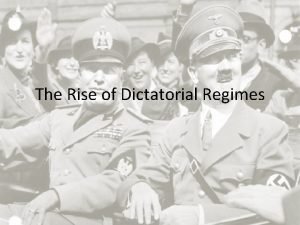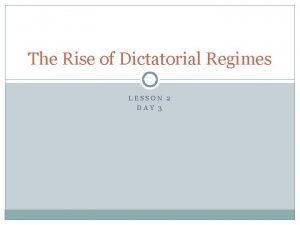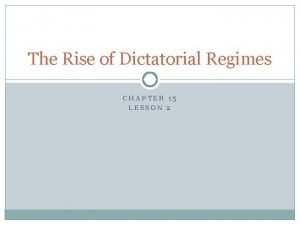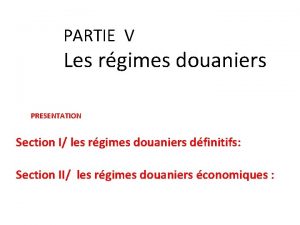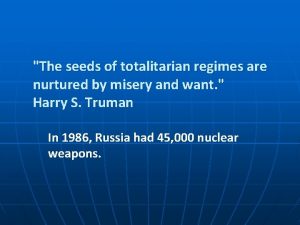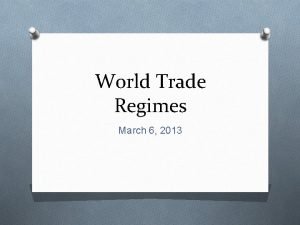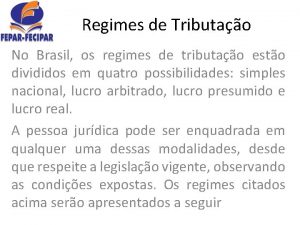THEME 2 THE IMPACT OF DICTATORIAL REGIMES ON


















- Slides: 18

THEME 2: THE IMPACT OF DICTATORIAL REGIMES ON THE ECONOMY AND SOCIETY

Key words in the question? To what extent is it correct to suggest that the treatment of the Russian working classes was uniformly bleak in the years 1855 – 1964 ? Peasants and urban workers

To what extent is it correct to suggest that the treatment of the Russian working classes was uniformly bleak in the years 1855 – 1964 ? Peasants and urban workers 5 minutes to blitz plan a basic outline with a partner: - basic structure - main issues to include - key comparisons

Structure • As ever, more than one possible way • Could consider thematic issues affecting all: eg food supply/working hours and conditions/housing • Types of people: eg peasants/urban workers/young-old/men-women/minorities • Peasants uniformly bleak/peasant improvements/urban worker uniformly bleak/urban worker improvements should work well as long as IT’S BEING DIRECTLY COMPARATIVE

Peasants bleak – working and living We’re always exploited to raise the funds for industrialisation. • 1861 Emancipation limitations • Famines 1891, 1921 and 1932 • War Communism c. 1920 Worst because… • Collectivisation ‘second serfdom’ in 1930 s • 1953 agricultural workers paid 1/6 wage of urban worker Least worst because… • Virgin Lands movement Grain requisitioned by force

Peasants bleak – political and repression We’re always exploited to raise the funds for industrialisation. • Land Captains 1880 s • Stolypin’s necktie 1905 -6 Worst because… • Collectivisation and de-kulakisation 1930 s • No real political rights throughout

Peasants bleak - other We’re always exploited to raise the funds for industrialisation. • Tool to help industrialisation • Suffering in WWI and WWII

Peasants not bleak – working and living This is a golden age for facial hair. • 1880 s Peasant Land Bank • 1906 Stolypin reforms Best because… • 1920 s NEP • 1950 s and 60 s Khrushchev reforms Encouraged entrepreneurialism

Peasants not bleak – political and repression This is a golden age for facial hair. • 1861 Emancipation human rights • Some voting rights to 1 st and 2 nd Duma • Freedoms under Prov Govt – seizing land

Peasants not bleak – other This is a golden age for facial hair. • Education improved • Attempts to provide technology – electrification, MTS • Younger peasants often took opportunities eg Stolypin, Virgin Lands

Urban workers bleak – living and working • Long hours – six days per week the Worst because… norm throughout though hours did drop except under Stalin • Low pay • Appalling conditions – output always the main concern • Stalin’s new work discipline punished absenteeism etc • Could be moved to where required under Stalin • Housing always poor and often appalling – Witte and Stalin

Urban workers bleak – political and repression • Excluded from meaningful voting • Striking often subject to repression – Lena Goldfields massacre 1912, Stalin

Urban workers not bleak – living and working • Hours generally got shorter – 11 hours Best because… to 7 hours, Khrushchev move towards 5 -day week • Factory inspectorates and child labour banned, 1880 s • Insurance system introduced 1903, then expanded • Housing improved under Khrushchev • Workers’ education and healthcare prioritised under Communists

Urban workers not bleak – political and repression • Unions gradually accepted more after 1900 • Had some influence – esp in 1917 but generally under the Communists eg introduction of NEP, after Novocherkassk • Genuine enthusiasm from some, esp shock brigades under Stalin

Urban workers not bleak – other • It depended who you were – piece rates under Stalin, women paid less than men throughout

Add the synthesis • 3 minutes to discuss with a partner and add some comparative judgements and conclusions to the plan in your booklet Example: Peasants and living and working conditions High point: NEP – payment incentive for all Low point: collectivisation and famine of 1932 – deliberately made worse by government Overall judgement: degrees of bleakness for most, but real opportunities at times for the most enterprising, eg Stolypin reforms

Tips from the examiners From the examiner report on a similar question in 2010: • This was the most popular question. The vast majority of candidates avoided the mistake of writing only about the peasants but a large number over-compensated by ignoring them completely. There was general ignorance about the working class in the Tsarist period except that they were exploited. Life under the communists was better handled although the more positive aspects of Stalin’s rule, such as educational, health and social improvements, were rarely mentioned. • Show diversity of experience – young/old; men/women; regional

Your plan Self assess your plan or swap it with a partner. Does it: • Include frequent direct comparison? • Include both peasants and urban workers? • Cover the full 100+ years across the full answer? • Directly answer the question, and hopefully show a line of argument running through the answer? • Include a firm basis of secure factual knowledge? • Show diversity of experience, not just treating all peasants and all workers as one?
 The rise of dictatorial regimes
The rise of dictatorial regimes Lesson 2 the rise of dictatorial regimes
Lesson 2 the rise of dictatorial regimes Fascism glorifies the state above the individual
Fascism glorifies the state above the individual Régimes douaniers
Régimes douaniers The seeds of totalitarian regimes are nurtured
The seeds of totalitarian regimes are nurtured Một số thể thơ truyền thống
Một số thể thơ truyền thống Thế nào là hệ số cao nhất
Thế nào là hệ số cao nhất Trời xanh đây là của chúng ta thể thơ
Trời xanh đây là của chúng ta thể thơ Frameset trong html5
Frameset trong html5 Sơ đồ cơ thể người
Sơ đồ cơ thể người Bảng số nguyên tố lớn hơn 1000
Bảng số nguyên tố lớn hơn 1000 đặc điểm cơ thể của người tối cổ
đặc điểm cơ thể của người tối cổ Vẽ hình chiếu vuông góc của vật thể sau
Vẽ hình chiếu vuông góc của vật thể sau Các châu lục và đại dương trên thế giới
Các châu lục và đại dương trên thế giới Glasgow thang điểm
Glasgow thang điểm ưu thế lai là gì
ưu thế lai là gì Tư thế ngồi viết
Tư thế ngồi viết Cái miệng bé xinh thế chỉ nói điều hay thôi
Cái miệng bé xinh thế chỉ nói điều hay thôi Các châu lục và đại dương trên thế giới
Các châu lục và đại dương trên thế giới
